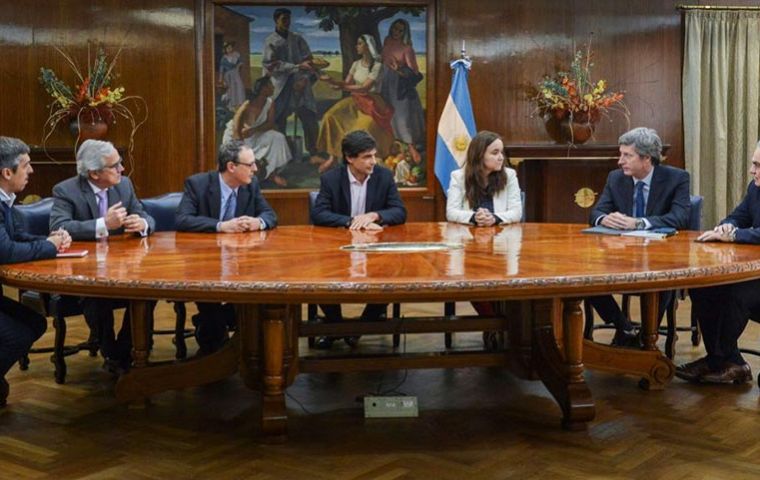MercoPress. South Atlantic News Agency
IMF mission in Argentina looking into the books and trying to sort out the future
 Alejandro Werner and IMF mission has been working with Finance minister Hernan Lacunza (C) and central bank chief Guido Sandleris
Alejandro Werner and IMF mission has been working with Finance minister Hernan Lacunza (C) and central bank chief Guido Sandleris An IMF mission is in Argentina and is going over the country's accounts with government top officials, to assess future disbursements of the US$ 57bn standby credit granted to the country, currently facing financial and political uncertainty, and on Monday are scheduled to meet with representatives from the opposition.
“The IMF delegation will be working in Buenos Aires with government officials, and also representatives of the opposition for another three to four days. There is a US$ 5.4bn disbursement pending for next month and since Argentina has complied with all its commitments, there is no reason why this should not happen”, according to Finance minister Hernan Lacunza who together with his team and central bank chief Guido Sandleris have been holding meetings with the IMF delegates.
The IMF mission is headed by Alejandro Werner, director of the Western Hemisphere, Roberto Cardarelli and Trevor Alleine and have been working with Argentine officials since their arrival on Saturday. This Monday they also plan to meet with representatives from the opposition, Alberto Fernandez, and his economic advisors.
Argentine president Mauricio Macri is running for reelection, and lost in the primary election to Fernandez, who is now the frontrunner for the October presidential competition and has strongly criticized the US$ 57bn standby loan to Argentina in 2018, and has pledged to “rework” the deal if elected.
Alberto Fernandez’s landslide support in the primary vote prompted the peso currency to fall by nearly 18% last week amid fears of a return to the interventionist economic policies of former President Cristina Fernandez de Kirchner, who is Fernandez’s vice presidential candidate.
Macri took office in 2015 promising to bring an end to the cyclical crises that over the last 100 years turned one of the world’s strongest economies into a serial defaulter. But an economic recovery has failed to materialize.
Voters fed up with Macri’s IMF-backed austerity measures and crippling inflation of 55% overwhelming snubbed Macri in the primary election, giving a 15-point lead to Fernandez, who promised on Thursday that Argentina has “no possibility” of default if he is elected.
Minister Lacunza who took office last week insisted on Sunday that the mid September disbursement of US$ 5.4bn should be delivered smoothly since it refers to the Argentine economy second quarter indicators, well before the August 11 primary and debacle for the Macri administration.
Monday's meeting of the IMF with Fernandez is expected to be cordial, because at the end of the day, they both need each other. The IMF needs to have a working relation with what seems to be the next government, and Fernandez has to ensure he will respect loan conditions, even “reworked”, but given the Kirchnerite governments' record of defaults, and gross intervention in the economy, must also insist in a image of rationality as not to scare investors or let sovereign bonds keep sliding.
Werner and Fernandez have met before, at the end of June, a month after the IMF authorized the Argentine central bank to put aside US$ 9bn in support of the Peso in case of a run to the dollar with the 11 August primary.
In effect, Fernandez asked Werner how come the IMF had authorized such a reserve, which is clearly banned by IMF rules, using the Fund's money to support a run on a currency, “was it an IMF agreement with Argentina or with Mr. Macri?” In obvious reference to the Trump administration support for the conservative Argentine president, which helped the approval by the IMF board.
The IMF is also wanting to know how much the reliefs and benefits announced by Macri after the primary defeat will cost the Argentine Treasury. They include VAT and income tax rebates, additional family allowance for each child, freezing of gasoline and public services prices, a bonus for pensioners, among other things. The Lacunza team estimates some 50.000 million Pesos which can be covered with the primary surplus of the first quarter, some 36.000 million Pesos and the rest with the extra activity the stimulus should generate.
Not very conclusive arguments but all sides need an “as normal as possible transition” and continuity between two governments if Alberto Fernandez finally receives the presidential sash on 10 December.




Top Comments
Disclaimer & comment rulesCommenting for this story is now closed.
If you have a Facebook account, become a fan and comment on our Facebook Page!